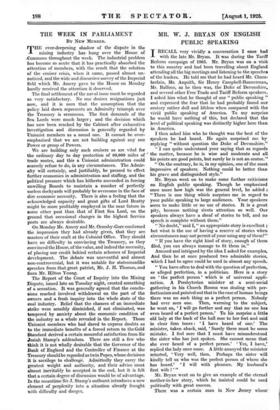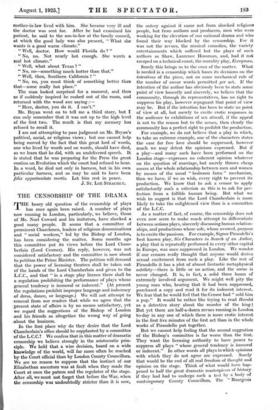MR. W. J. BRYAN ON ENGLISH PUBLIC SPEAKING
T RECALL very vividly a conversation I once. had with the late Mr. Bryan. It was during the Tariff Reform campaign of 1905. Mr. Bryan was on a visit to this country and had been travelling about England attending all the big meetings and listening to the speeches of the leaders. He told me that he had heard Mr. Cham- berlain, Mr. Asquith, Sir Henry Campbell-Bannerman, Mr. Balfour, as he then was, the Duke of Devonshire, and several other Free Trade and Tariff Reform speakers. I asked him what he thought of our "public speaking!'
and expressed the fear that he had probably found our oratory rather dull and lifeless when compared with the vivid public speaking of America. To my surprise he would have nothing of this, but declared that the level of political speaking was distinctly higher here than in America.
I then asked him who he thought was the best of the speakers he had heard. He again surprised me by replying "without question the Duke of Devonshire."
"I can quite understand your saying that as regards the matter, because he is wise and moderate and all his points are good points, but surely he is not an orator."
"On the contrary, he is, in my opinion, one of the most impressive of speakers. Nothing could be better than his grave and distinguished style."
Mr. Bryan went on to make some further criticisms. on English public speaking. Though he emphasized once more how high was the general level, he added "There is one thing which surprises me in regard to your public speaking to large audiences. Your speakers seem to make little or no use of stories. It is a great pity, because nothing rivets attention so well. Our speakers always have a sheaf of stories to tell, and no speech is complete without them."
"No doubt," said I," an appropriate story is excellent ; but what is the use of having a reserve of stories when circumstances may not permit of your using any of them?"
"If you have the right kind of story, enough of them filed, you can always manage to fit them in."
Amused and intrigued by the idea I asked for examples. And then he at once produced two admirable stories, which I had to agree could be used in almost any speech.
"You have often to deal with the question of perfection, or alleged perfection, in a politician. Here is a story on 'the perfect person' which is of universal appli- cation. A Presbyterian minister at a semi-social gathering in his Church Rooms was dealing with per- fectionism and pointed out that in the case of human beings there was no such thing as a perfect person. Nobody had ever seen one. Then, warming to the subject, be went on, I will- go further and say that no one has even heard of a perfect person.' To his surprise a little old lady at the back of the hall rose to her feet and said in clear firm tones : I have heard of one.' The minister, taken aback, said, Surely there must be some mistake. I feel sure that I must have misunderstood the sister who has just spoken. She cannot mean that she ever heard of a perfect person." Yes, I have,' replied the lady once more. A little annoyed the minister retorted, Very well, then. Perhaps the sister will kindly tell us who was the perfect person of whom she has heard.' 'I will with pleasure. My husband's first wife ! ' " Mr. Bryan went on to give an example of the eternal mother-in-law story, which he insisted could be used politically with great success.
There was a certain man in New Jersey whose! mother-in-law lived with him. She became very ill and the doctor was sent for. After he had examined his patient, he said to the son-in-law at the family council, at which the good lady was also present, "What she wants is a good warm climate."
"Well doctor. How would Florida do ? "
"No, no. Not nearly hot enough. She wants a real hot climate."
"Well, what about Texas ? "
No, no—something much hotter than that."
" Well, then, Southern California ? "
"No, no, you must think of something better than that—some really hot place."
The man looked surprised for a moment, and then as if suddenly inspired he rushed out of the room, and returned with the wood axe saying :— " Here, doctor, you do it. I can't."
• Mr. Bryan went on to tell me a third story, but I can only remember that it was not up to the high level of the first two. The result is that my memory has refused to recall it.
I am not attempting to pass judgment on Mr. Bryan's political, social, or religious views ; but one cannot help being moved by the fact that this great lord of words, one who lived by words and on words, should have died, as we learn that he did, with an =delivered speech. It is stated that he was preparing for the Press the great oration on Evolution which the court had refused to hear. In a word, he died not only in harness, but in his own particular harness, and so may be said to have been felix opportunitate mortis. Let him rest in peace.
J. Sr. LOE STRACILEY.







































 Previous page
Previous page